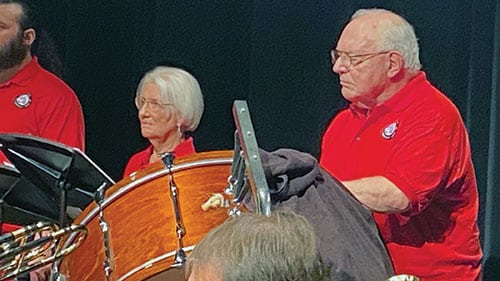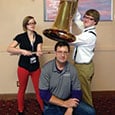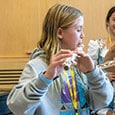Originally published: August 1997
Whenever directors question whether music programs really make a difference, a note of thanks from a student, a kind word from a parent, or a hug at graduation dispels all doubts. Sometimes, years later, a former student expresses how much a director or an ensemble influenced his life.
Recently I returned from a trip to discover that Ed Raines, a 55-year-old member of our church, had died suddenly. Although I did not know him well, I had met his son at church and saw him frequently at school. At the entrance of the funeral parlor an easel displayed a collage of photographs of Ed as a high school band student practicing the baritone, resting after a grueling marching band practice (he was the drum major), leading the band in a parade, and hanging out with the majorettes.
I suddenly realized that these photographs captured Ed during some of the happiest and most memorable experiences of his life. His widow explained that Ed’s father was an alcoholic, and band served as a refuge from difficulties at home and gave him great confidence and pride. One of his mother’s proudest moments was during a Christmas parade when Ed strutted over to her and bowed deeply before zig-zagging back to the band. She said that Ed appreciated that the band director believed in him when no one else did. Although Ed did not follow a career in music, he became a teacher and briefly taught band as part of his duties.
Since learning about how much Ed’s life was affected by his experience in band, I have reflected on how much power teachers have to create memories that may last a lifetime. Whatever students do after graduation, they can always remember, with joy or indifference, the concerts, ratings, trips, a kind word, an insult, friendships, a chance to be a leader, or awards received. Teachers affect each aspect of these memories in some ways, especially the concepts of what contributes to developing an ensemble that works together.
I grew up in a military family and moved often. My most inspiring early influence was the junior high school band director in Auburn, Alabama. One day she gave me a progress report, which was usually reserved for problem students. Somewhat concerned, I looked at the form and was relieved to see that she was simply informing my parents that I was doing well. However, in high school (in another city) I worked very hard, but compliments never came. I now send a personal, hand-written note to every student at least once before they graduate to compliment each individual for what they do well.
In the afterward to the book Goodbye Mr. Chips, author James Hilton observes that “no two schools are alike, but more than that – a school with two hundred pupils is really two hundred schools, and among them, almost certainly, are somebody’s long-remembered heaven and somebody else’s hell.” The same can be said of a band or orchestra with a hundred members. Every student has special interests and perspectives. Our task, however daunting, is to remember to think about each person as an individual. Sometimes we become so wrapped up in problems of the moment, performances, ratings, and pressure to achieve lofty goals, that we lose our perspective and forget to see the band as individuals.

Trey Reely’s parents in a community band at ages 90 and 86.






